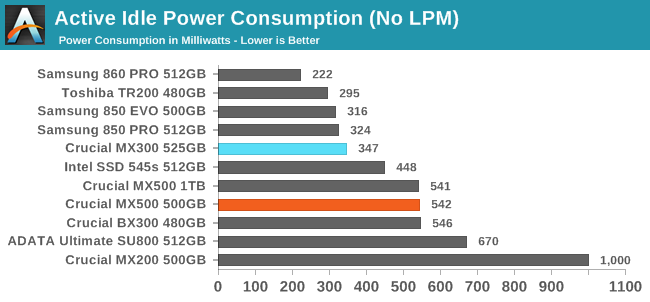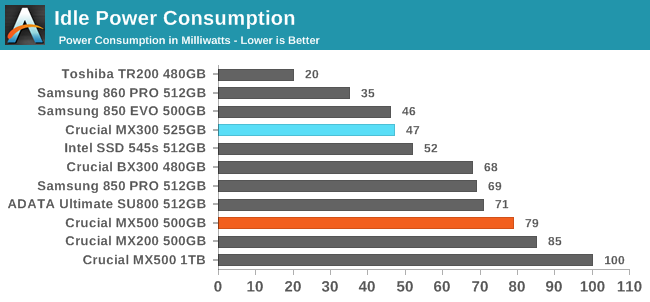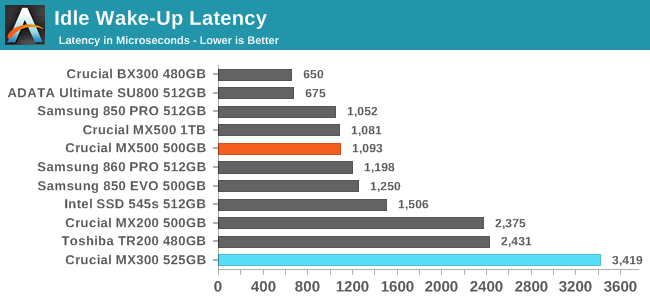The Crucial MX500 500GB SSD Review: A Second Look
by Billy Tallis on February 2, 2018 9:30 AM ESTPower Management
Real-world client storage workloads leave SSDs idle most of the time, so the active power measurements presented earlier in this review only account for a small part of what determines a drive's suitability for battery-powered use. Especially under light use, the power efficiency of a SSD is determined mostly be how well it can save power when idle.
SATA SSDs are tested with SATA link power management disabled to measure their active idle power draw, and with it enabled for the deeper idle power consumption score and the idle wake-up latency test. Our testbed, like any ordinary desktop system, cannot trigger the deepest DevSleep idle state.
Idle power management for NVMe SSDs is far more complicated than for SATA SSDs. NVMe SSDs can support several different idle power states, and through the Autonomous Power State Transition (APST) feature the operating system can set a drive's policy for when to drop down to a lower power state. There is typically a tradeoff in that lower-power states take longer to enter and wake up from, so the choice about what power states to use may differ for desktop and notebooks.
We report two idle power measurements. Active idle is representative of a typical desktop, where none of the advanced PCIe link or NVMe power saving features are enabled and the drive is immediately ready to process new commands. The idle power consumption metric is measured with PCIe Active State Power Management L1.2 state enabled and NVMe APST enabled.


With less DRAM, the 500GB Crucial MX500 saves a bit of power relative to the 1TB model when the drives are in low power state, but their active idle power consumption is essentially the same. In both scores, the Crucial MX500 is worse than many competitors and the predecessor MX300.

The Crucial MX500 is reasonably quick to wake from idle, though the BX300 and the ADATA SU800 are substantially faster to wake up with the same SSD controller. The MX300 had been unusually slow to wake.










25 Comments
View All Comments
KarlKastor - Saturday, February 3, 2018 - link
I would like to see a review of old SSDs (Indlinx Barefoot, first Intel SSDs, Sandforce SSDs, crucial c300, Samsung 830 for example) and how they would compete against today's drives. The test parcours is much more detailed and challenging for the drives. Can older drives pass this test reasonable good enough or is an upgrade to a modern ssd an major improvement, besides of capacity.velanapontinha - Saturday, February 3, 2018 - link
^this^peevee - Monday, February 5, 2018 - link
Most decent SLC SATA drives should be fine, but there were terrible examples like Kingston V-series which were not much better than HDDs to begin with.But I'd like to see the tests too.
Dragonstongue - Thursday, June 21, 2018 - link
am using your charts to compare the previous results of the MX200 vs the "new" MX500, and most of the numbers and data have changed to show the MX200 as "better" than it once was, if properly tested, this should not have been shown as such.IMHO, if a drive at a specific time using a specific set of drivers etc had say a data rate of 217.85 (crucial MX200 500gb) why does this review "change" to show this same drive now being 235 (a gain of around 8%)
numbers should not be becoming "magically better" IMO, unless firmware was changed without notification, or tests were not run properly the first time around or something like that?
it is quite hard to do direct comparisons when your data does not agree with itself ^.^
MX500 is supposed to be "a fair bit quicker" in most things than MX200 or MX300 (around 18% for the 500gb models..20 odd % for the 1tb models) something is not agreeing with itself based on your data/numbers/review, this is troublesome to say the least, so I suppose my question in this regard is, how "factual" is the testing methodology being used, such as latency numbers (where the original data of MX200 read higher numbers in ms than this review does making this review appearing as if the mx200 is that much faster than it was previously (less latency)
and the power consumption was also higher previously whereas in this review it uses "less" power, the heck is up with this?
if one screwed up original testing methodology "I understand" but, if one just changes data willy nilly to suit vendors or make the older or newer stuff appear better than it actually is, screw that noise (we already have plenty enough companies/corps that do that crud daily..like Ngreedia, Apple, Intel, MSFT etc)
Just saying, had my eye on the MX500, my MX100 256gb has been working very well for me last 2.5-3 years or something like that (still at 99% life) MX200 500gb still snappy (though not quite as snappy as the MX100 for some reason and I have never had it "loaded" currently is at 92% life and yet is at least a 9 month newer drive, have not copied.deleted anywhere close to as much as it claims I have which is confusing...MX500 is supposed to have that much more endurance, but, if the MX200 seems to "chew" endurance more than it should, that is not a good thing.
I have taken all the steps I can to reduce writing to the drive (unless needed) have trim on since day 1 etc...
Anyways, compare the "original" MX200 data you reviewed dated may 22, 2015, with this review dated february 2, 2018, quite a difference in appearances from how so so the drive appeared (MX200) vs the way it "now" appears (seems like not quite a poor drive, though it never was crud drive)
https://www.anandtech.com/show/9258/crucial-mx200-...
https://www.anandtech.com/show/12263/the-crucial-m...
would say IMO, double check your info (past info) so you are not making silly mistakes if possible (I know no one is perfect by all means, but I highly doubt you keep hundreds of drives on hand so you can test them a year or 2 down the line, most review sites do not, so does this mean pulling numbers out of thin air?)
take care, love your site by all means, lots of good reading ^.^
dpjtpa - Friday, June 14, 2019 - link
This is definitely the option I will be purchasing soon